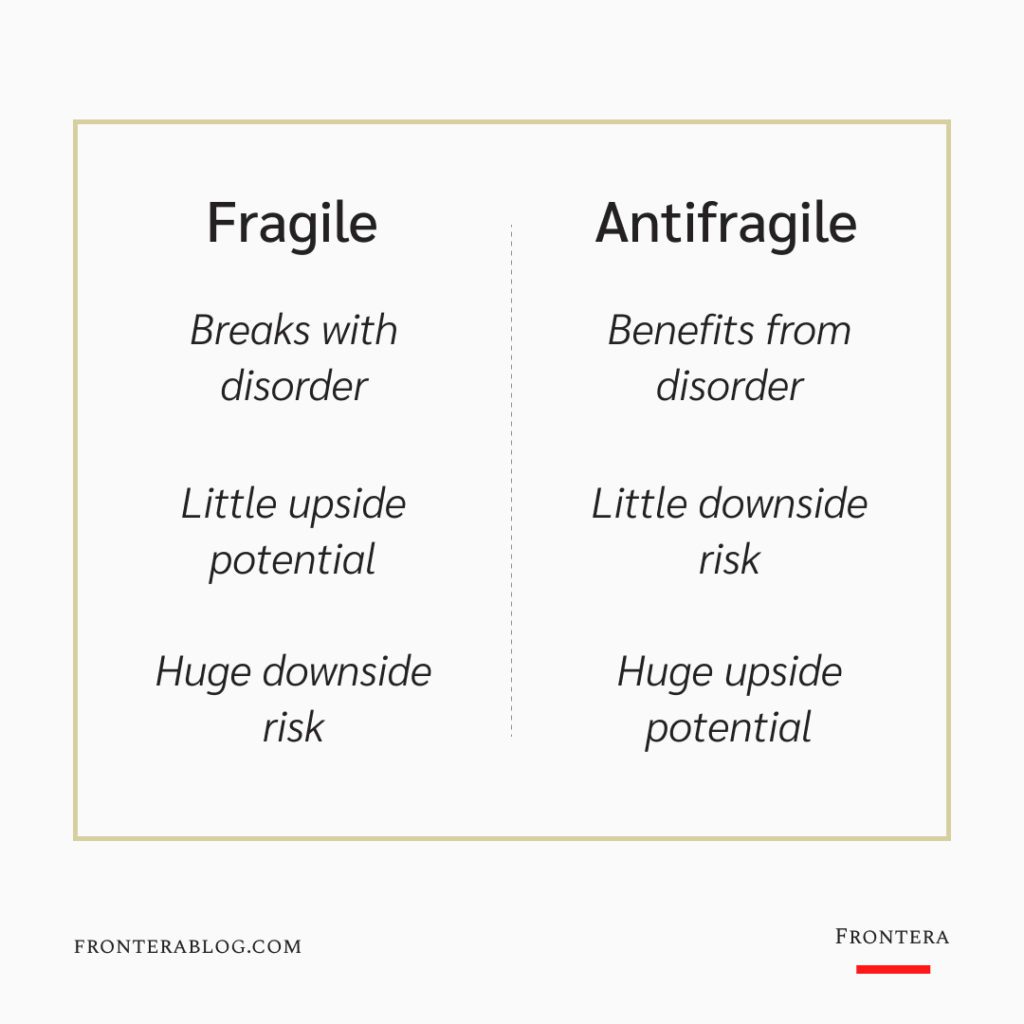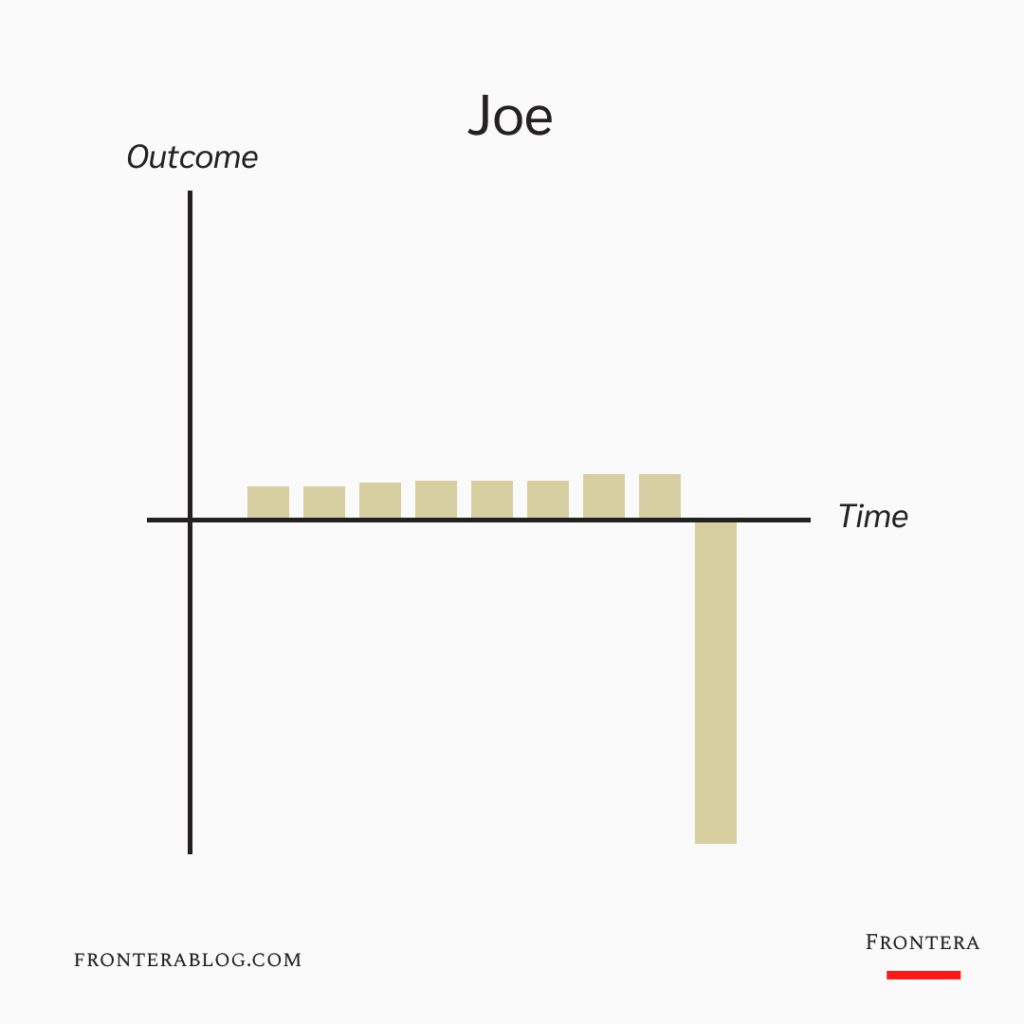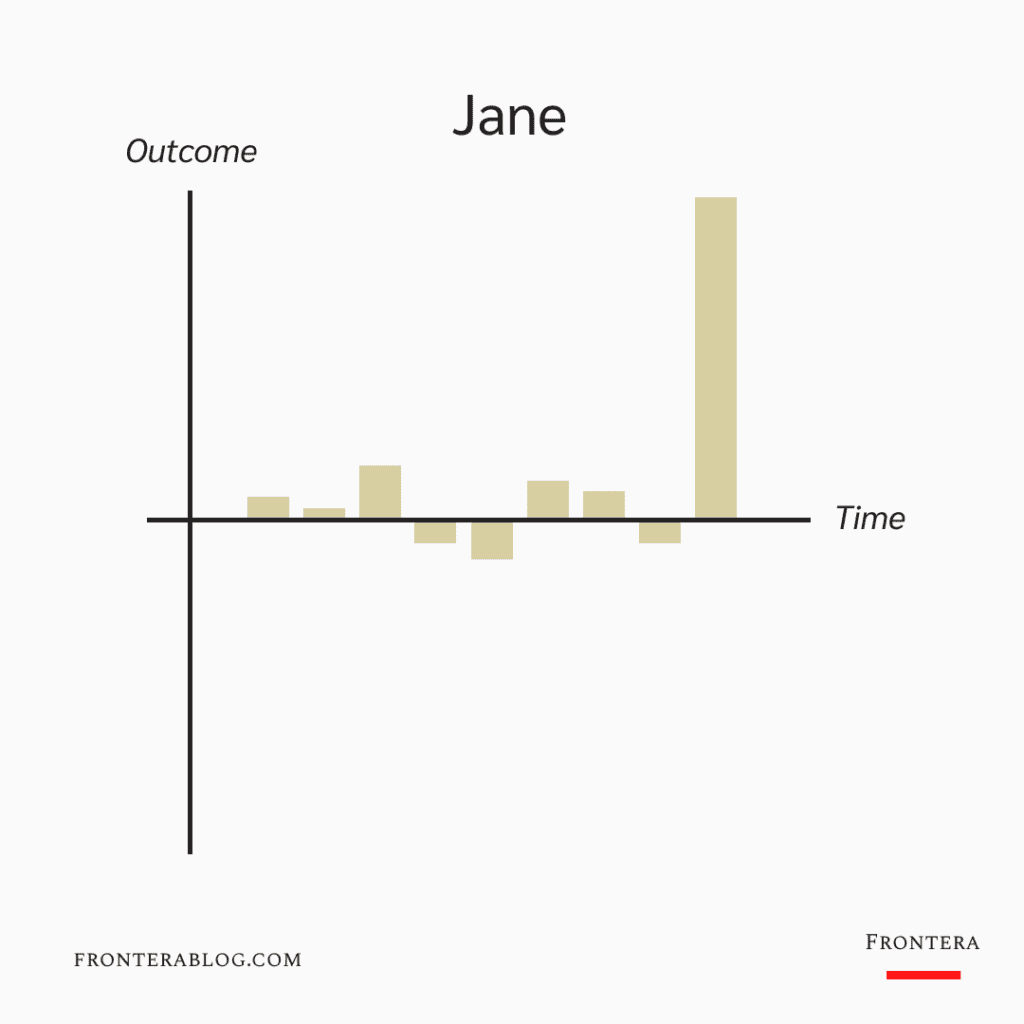What’s the definition of Antifragility?
We know fragile things. They break easily with a little stress and disorder.
Antifragile things don’t just resist a shock, damage, or crisis but also thrive under these conditions.
It’s a concept developed by Nassim Taleb in his book Antifragile.

Let’s look at two examples to see how you can use it in your life:
Fragile: Little upside potential, huge downside risk
Imagine an employee of a bank, we’ll call him Joe.
Joe has a stable job, he gets raises every year and gets promoted a couple of times in his career.
But after 20 years in his job, the 2008 crisis comes. The bank is hit hard by the crisis and had to go through a restructuring. As a result of that, Joe finds himself unemployed.
Since he is close to 50 years old and all sector is in crisis, it’s impossible to find another job for him.
Joe thought he had a stable and safe job since he was getting fixed monthly salaries. But actually, his career was fragile.
He had many little upsides (monthly salaries, promotions) throughout the years. But he was also running a risk with a huge downside: getting fired and not being able to find a job again.
Joe believed not taking risks and depending on a salary was safe, but a crisis was enough to turn his life upside down.

Antifragile: Little downside risk, huge upside potential
Now imagine an entrepreneur selling products online. We’ll call her Jane.
Jane loves designing products. A couple of years ago she decided to sell her products online.
She needed a few thousand dollars as an initial investment to set up everything. She has a small social media audience and a website to sell her products.
But her income is not stable. Some months she has had good sales. Some other months she has so little that she spends from her savings.
She tests new products regularly to find out what sells best. Some of the tests fail, but she learns something with each trial. In the end, the cost of failure is cheap in what she is doing.
In March 2020, the COVID crisis starts. The world goes under lockdown. Many people lose their jobs or get furloughed.
But for Jane’s business, it’s like a lottery ticket.
She sees that people shop online and buy digital products much more than before. So she immediately changes her site to make the digital products more visible.
Her sales go up 10x just in a couple of months. This increase creates a snowball effect since new customers are sharing Jane’s products on their social media and adding even more sales.
Until the crisis, Jane thought her job was too risky. But with the crisis, she achieved a success she could never imagine.
Because in reality, Jane was antifragile. Her job did have many little downsides, but her upside was unlimited.
She was making many trials and errors, so her learnings put her in a perfect position to take advantage of the crisis.

Key lessons From Antifragile:
- Time favors the antifragile. As an entrepreneur survives, he increases his chances to get a lucky event. For the fragile it’s the opposite; a bad event (an earthquake) can happen and break the coffee cup.
- Stressors and volatility make you antifragile. People know post-traumatic trauma. But post-traumatic growth is more common. When the stressors are not extreme, it strengthens a person or a system. Vaccines and white hat hacking are other examples.
- Lack of stressors makes you fragile. When you don’t use your muscles, they shrink. If a mother is overprotective, the kid doesn’t learn how to live on his own.
- Bigger systems become fragile. That’s why small, decentralized governments (like Switzerland) are more antifragile than centralized ones. Because the mistakes are distributed. But centralized governments’ mistakes become disasters for millions (hyperinflation, famine, etc.)
- Never let a mistake go to waste. Aviation is antifragile (from a safety perspective). Because they kept learning from their mistakes. Each plane crash made the next flight safer.
- The future is unpredictable. So don’t try to predict, prepare. You’d rather be antifragile than intelligent. Remember the hindsight bias.
Four Ways to Become Antifragile in Business and Life:
1. Increase Your Optionality
Optionality is having many options to choose from.
And it reduces our dependence on future predictions.
Because with an option, you can decide after the events occurred.
Venture capitalists know they can’t predict which startup will be successful.
So they make small investments in many startups, knowing most will fail.
But when one startup becomes successful —after events occur— they can cash out with exceptional returns.
Remember, wealth is from Extremistan. So focus on having options with low cost and high potential return:
2. Use Barbell Strategy
An imbalanced barbell strategy for portfolios (and life) increases optionality and a way to become antifragile.
- Portfolios: 90% cash-like defensive assets. And 10% risky options with unlimited upside (e.g. risky put options to benefit from crises)
- Personal: A steady income — a low-intensity 9-5 job or freelancing. And side projects with unlimited upside. Once you get one successful project, you can quit the safe job
- Business: One core product that brings guaranteed revenue. And experiments with new mini-products to create optionality
This strategy has low but guaranteed returns for a long time.
And extremely high when an unexpected event (crisis, war, luck) happens.
You don’t need to predict how and when it will happen.
But it will happen one way or another, the point is to have the option to benefit from it.
3. Add Redundancy
Redundancy is not only insurance but also a way to become antifragile.
When an unexpected event happens (e.g. supply chain crisis), pseudo–efficient companies fail as they have no extra inventory or resources.
And companies with redundancy thrive.
On a personal level, one way to build redundancy is by keeping cash-like assets.
So you can gain more when the crisis hits or if you have a sudden opportunity to invest.
Even nature likes redundancy.
Our bodies have evolved to have two kidneys and lungs; despite one being enough to survive.
4. Solve Problems With Subtraction
When people want to solve a problem, they look for additive solutions.
You’d like to improve your health? Get supplements.
Project is failing? Assign more resources.
But the solution comes with a higher cost and unexpected side effects, which causes fragility.
Via Negativa is to solve problems by subtracting — it means “the negative way” in Latin.
It’s cheaper and more effective.
Taleb gives examples in the book:
“In my own experience, a considerable jump in my personal health has been achieved by removing offensive irritants: the morning newspapers, the boss, the daily commute, air-conditioning (though not heating), television, emails from documentary filmmakers, economic forecasts, news about the stock market, gym “strength training” machines, and many more.”
Some more wisdom from Antifragile book:
On procrastination:
“Since procrastination is a message from our natural willpower via low motivation, the cure is changing the environment, or one’s profession, by selecting one in which one does not have to fight one’s impulses.”
On advice:
“Never ask the doctor what you should do. Ask him what he would do if he were in your place. You would be surprised at the difference.”
On life expectancy of ideas and technology:
The Lindy Effect: “For the perishable, every additional day in its life translates into a shorter additional life expectancy. For the nonperishable, every additional day may imply a longer life expectancy. So the longer a technology lives, the longer it can be expected to live.”
On getting to know yourself:
“You will never get to know yourself—your real preferences—unless you face options and choices.”
On company executives:
“In addition, my experience of company executives, as evidenced by their appetite for spending thousands of hours in dull meetings or reading bad memos, is that they cannot possibly be remarkably bright. They are no entrepreneurs—just actors, slick actors (business schools are more like acting schools). Someone intelligent—or free—would likely implode under such a regimen.”
–
Enjoyed this article?
Then you’ll love the How Brands Win Newsletter.
Get the “7 Positioning Sins That Cost B2B Brands Millions” guide when you join. It’s free.
Recommendations:
Book: Nassim Taleb – Antifragile
Video: Nassim Taleb’s talk (19 mins) on Antifragility.
